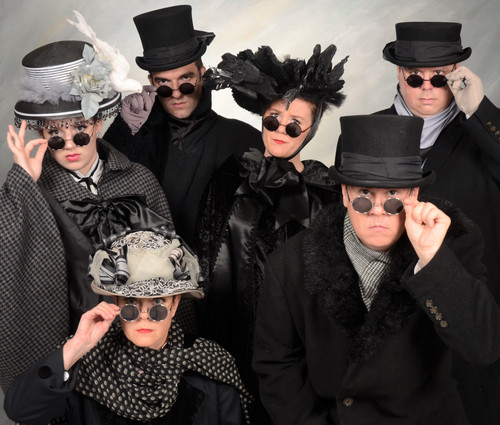Cold-Hearted But Great Fun: A GENTLEMAN’S GUIDE TO LOVE AND MURDER at Dundalk Community Theatre
Theater Reviews Page | Previous Theater Review | Next Theater Review
Cold-Hearted But Great Fun: A GENTLEMAN’S GUIDE TO LOVE AND MURDER at Dundalk Community Theatre

Posted on BroadwayWorld.com October 26, 2019
A Gentleman’s Guide to Love and Murder (Broadway 2014, now being revived by the Dundalk Community Theatre) resides in that small category of shows cold-hearted enough to get away with encouraging audiences to laugh as characters die. (Chicago, Heathers and Blithe Spirit belong here too.) It’s a neat trick even for a short time, inducing audiences to dissociate from their normal moral reactions. It helps if the victims are contemptible in some way or if the method of decease is comically stereotyped and overplayed or if there is an element of farce in the luring of the victim to his doom, and all these methods are employed here, especially the contemptibility tactic.
Significantly, there seems to have been no London production of the show, perhaps because the victims (like the killers) are British. But getting Americans in a frame of mind where they’ll despise British aristocrats is like shooting fish in a barrel (unless they’re Americans who happen to be still in a daze from a viewing of Downton Abbey). And here the setup provides all the inducement we Yanks need to salivate for Limey blue blood: a highborn family, the D’Ysquiths, disowning a daughter because she eloped with a lowborn foreigner, and (most of them) behaving in impeccably beastly ways towards her son Monty (Rob Tucker).
And there’s a neat twist as well: almost all the D’Ysquiths, those whose blue blood will in fact be spilled in the course of the festivities, are played by a single actor, in this case the extraordinarily versatile Patrick Martyn. He is spot on as Asquith D’Ysquith, Jr. (a snobbish and contemptuous young aristocrat), Lord Adalbert D’Ysquith, (a snobbish and contemptuous old aristocrat), Reverend Lord Ezekial D’Ysquith (a drunken clergyman with a sense for architecture that outpaces his sense of balance), Henry D’Ysquith (of doubtful sexual orientation and cursed with a disastrous hobby), Lady Hyacinth D’Ysquith (a faddish and self-serving proponent of high-profile charities), Major Lord Bartholomew D’Ysquith (a bodybuilder who unfortunately overestimates both his prowess and Monty’s probity), Lady Salome D’Ysquith Pumphrey (an actress in need of a better props mistress), and Asquith D’Ysquith, Sr. (a thoroughly decent paterfamilias who is still, alas, doomed by the plot).
There is more at stake for Monty than revenge; he would like to inherit the family fortune and castle. He would also like to marry Phoebe D’Ysquith (Marina Yiannouris), a member of the family who (fortunately for her) is not ahead of Monty in the line of succession – though his heart probably belongs more to the fickle and materialistic Sibella (Alison Comotto). The audience is indeed fortunate that Monty’s affections are divided, because Yiannouris and Comotto are both blessed with extraordinary voices, and given numerous opportunities to show them off, frequently at the same time. In the same vein the ensemble (Alyssa Bell, Casey Lane, Jane E. Brown, Jim Baxter, Ken Ewing, and Joey Hellman, pictured above) sings with beautiful precision, an absolute requirement in a score with the plethora of patter songs and numbers designed to poke fun at the British stiff upper lip by calling on the singers to hit notes and syllables with identical timing and intonation – not to mention composer Steven Lutvak‘s piquant harmonies. And speaking of patter songs, Rob Tucker delivers a handful of them with aplomb. I don’t think Jefferson Mays, who held down the role of Monty throughout the show’s Broadway run, handled them any better.
Yes, as I have said, the show has a cold, cold heart, but it is great fun, and Dundalk Community Theatre has giving it a rousing staging. Recommended.
Copyright (c) Jack L. B. Gohn, except for production photo.
Theater Reviews Page | Previous Theater Review | Next Theater Review